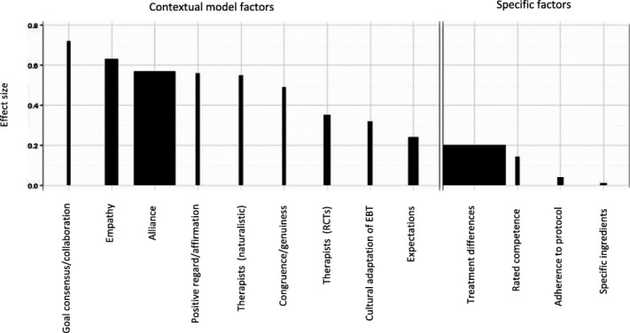The biggest drivers of success in psychotherapy are not the specific techniques or styles, but the common factors, especially shared goals, empathy, alliance, positive regard, and therapist effects.
Paper: How important are the common factors in psychotherapy? An update
Why does one therapist succeed while another fails, even using the same methods?
Research shows that across different approaches, what often predicts success is not the unique techniques but the shared human factors. Meta-analyses indicate five reliable common factors with medium to strong effects, as measured by Cohen's d:
- Goal consensus and collaboration show the strongest effect at d=0.72. This means the therapist and patient agree on goals and tasks, then work together with a purpose. When the plan feels shared and doable, hope rises and follow-through improves.
- Empathy seconds at d=0.63 across 59 studies. The therapist tunes into feelings, reasons, and perspectives. Empathy strengthens genuine relationships and can heighten positive expectations. People feel understood, which reduces threat and opens space for change.
- Alliance follows at d=0.57 from nearly 200 studies and over 14,000 patients. The alliance combines bonds, goals, and tasks. The effect remains even when researchers test for patient bias or halo effects.
- Positive regard and affirmation have d=0.56. Respect, warmth, and validation encourage clients to take risks and be honest. Feeling valued moves behavior.
- Therapist effects in naturalistic settings reach d=0.55. Some therapists get better results across many patients and methods. They form strong alliances widely, use flexible interpersonal skills, show useful self-doubt, and practice skills outside sessions.
Together these factors fit the effective contextual model: First, a real relationship. Second, credible expectations built on a shared story of the problem and the plan. Third, health-promoting actions that the client is willing to try.
